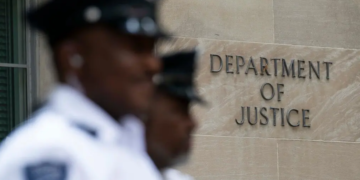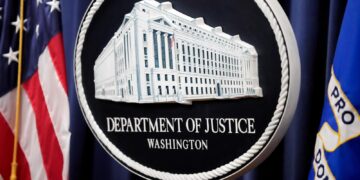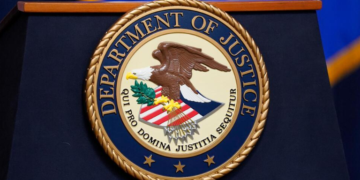May 17, 2025 Story by: Publisher
A sweeping reorganization inside the U.S. Department of Justice has sparked fears that a long-standing investigation into the 1970 Jackson State College killings—one of the nation’s most haunting civil rights cold cases—could be sidelined indefinitely.
The case, pursued under the Emmett Till Unsolved Civil Rights Crime Act, is now at risk amid mass resignations, leadership changes, and shifting federal priorities.
A Campus Tragedy Left Unresolved
On the night of May 14, 1970, law enforcement officers fired more than 400 rounds into a women’s dormitory at Jackson State College during a protest over racial injustices and the Vietnam War. Two young Black men—Phillip Lafayette Gibbs, 21, and James Earl Green, 17—were fatally shot. Despite multiple state and federal inquiries at the time, no officers were ever charged, and the case remained unresolved for decades.
Investigating Through the Emmett Till Act
In 2008, Congress passed the Emmett Till Unsolved Civil Rights Crime Act to investigate racially motivated killings that occurred before 1980. The Justice Department opened a Till Act investigation into the Jackson State shootings during the first Trump administration, making it one of only two remaining active cases in Mississippi by 2024.
But the investigation’s quiet progress has left families in the dark. Dale Gibbs, widow of Phillip Gibbs, said she only recently learned that the DOJ had reopened the case. “We’ve waited decades. Every time we think someone will tell the truth, it disappears again,” she told reporters.
Internal Exodus and New Priorities
Since President Trump’s return to office, the DOJ’s Civil Rights Division has lost approximately 70 percent of its career attorneys. Many of those departing cited deep concerns about political interference and a diminished focus on racial justice.
Leadership has redirected remaining resources. Senior attorneys previously assigned to civil rights cold cases have been reassigned to initiatives targeting sanctuary cities. Federal grants once earmarked for historic investigations have been shifted to support voter fraud enforcement and religious liberty complaints.
Under new Assistant Attorney General Harmeet Dhillon, the Civil Rights Division has issued mission updates emphasizing protection against anti-Christian bias and support for “viewpoint diversity”—messaging that diverges sharply from the historical focus on anti-Black violence and segregation-era crimes.
A Case in Limbo
The Justice Department has made no public comment on the current status of the Jackson State probe. With staffing depleted and new directives in place, civil rights advocates worry the case could be quietly closed or indefinitely delayed.
“What message does it send if we abandon accountability for the murder of two students, shot in their own dorm during a protest?” said a former DOJ official who worked on Till Act cases. “If we can’t pursue justice for Phillip Gibbs and James Earl Green, we are admitting that the law has limits when it comes to Black lives.”
What’s at Stake
If the Jackson State case is shelved, it would mark a significant blow to the Emmett Till Act’s mission and potentially signal a shift away from pursuing justice in civil rights-era killings. Advocates argue that the DOJ’s handling of this case could set a precedent for how America addresses unresolved racial violence.
Civil rights organizations are calling for congressional oversight, funding protections, and a recommitment to cold-case investigations. A DOJ decision on resource allocation for the remaining Till Act cases is expected later this year.
“Justice delayed is justice denied,” said one advocate. “And justice ignored is justice erased.”
Notable Active Emmett Till Act Investigations
The Justice Department’s 2024 report indicates several other civil rights‑era cases remain open under the Emmett Till Unsolved Civil Rights Crime Act:
- Emmett Till (1955, Mississippi): The landmark case in which a 14‑year‑old Black boy was lynched in Money, Mississippi, prompting a federal investigation that has been intermittently active under the Till Act. (DOJ, 2024)
- Freedom Summer Murders (1964, Mississippi): The killings of James Chaney, Andrew Goodman, and Michael Schwerner during the civil rights “Freedom Summer” campaign, still under review to determine federal civil rights violations. (DOJ, 2024)
- Orangeburg Massacre (1968, South Carolina): The deadly shooting of student protesters at South Carolina State University, with DOJ investigators examining whether constitutional violations occurred. (DOJ, 2024)
- 16th Street Baptist Church Bombing (1963, Alabama): The bombing that killed four Black girls in Birmingham, Alabama, reexamined under the Act for potential prosecutable offenses. (DOJ, 2024)
- Jackson State College Shootings (1970, Mississippi): The investigation into the police shooting of students Phillip Gibbs and James Earl Green during a campus disturbance, currently imperiled by DOJ staffing changes.
- Birmingham Church Bombing (1963, Alabama): The bombing of the 16th Street Baptist Church that killed four Black girls, with follow‑up inquiries into potential accomplices. (DOJ, 2024)
- Freedom Summer Murders (1964, Mississippi): The killings of James Chaney, Andrew Goodman, and Michael Schwerner during voter-registration drives. (DOJ, 2024)
- Elaine Massacre (1919, Arkansas): One of the deadliest racial conflicts in U.S. history, with investigations into state militia involvement. (DOJ, 2024)
- Tulsa Race Massacre (1921, Oklahoma): The destruction of Black Wall Street in Greenwood, with renewed probes into arson and murder. (DOJ, 2024)
- Colfax Massacre (1873, Louisiana): A Reconstruction‑era attack on Black voters and Republican officeholders, revisited for federal civil rights violations. (DOJ, 2024)
- Rosewood Massacre (1923, Florida): The violent destruction of a Black town and killing of residents, still under review for civil rights offenses. (DOJ, 2024)
- Wilmington Coup (1898, North Carolina): An assault and overthrow of a legitimately elected, biracial government, examined for possible federal hate‑crimes charges. (DOJ, 2024)
- Ocoee Election Day Riots (1920, Florida): Attacks on Black voters seeking to exercise their franchise, with potential civil rights crime implications. (DOJ, 2024)
- Deacons for Defense Assault (1965, Louisiana): The shooting of civil rights activists defending their community, reevaluated for potential prosecutorial action. (DOJ, 2024)
- Albany Movement Confrontations (1961, Georgia): Federal review of law enforcement actions against civil rights protesters during sit‑ins and marches. (DOJ, 2024)
- Bloody Sunday March (1965, Alabama): Reassessment of violent suppression of voting rights marchers at the Edmund Pettus Bridge in Selma. (DOJ, 2024)
- Chicago Freedom Movement Riots (1966, Illinois): Investigations into police response to civil rights demonstrations led by Dr. Martin Luther King Jr. (DOJ, 2024)
- Camden Civil Rights Deaths (1971, New Jersey): Probes into shootings of activists during protests against school segregation. (DOJ, 2024)
- Jacksonville Repression (1964, Florida): Review of law enforcement tactics against voter registration drives targeting Black citizens. (DOJ, 2024)
- Greenwood Greenwood Murders (1964, Mississippi): Federal examination of unsolved murders of civil rights workers beyond Freedom Summer. (DOJ, 2024)
- Cleveland Hough Riots (1966, Ohio): Investigation into police violence against protesters during housing equality rallies. (DOJ, 2024)
- Maryville College Burning (1962, Tennessee): Review of arson attacks on Black student housing at Tennessee institutions. (DOJ, 2024)
- San Francisco Civil Rights Protests (1966, California): Examination of law enforcement actions during demonstrations for school integration. (DOJ, 2024)
Source: The Marshall Project / Civil Rights Division Emmett Till Act (Cold Case Closing Memoranda)
















